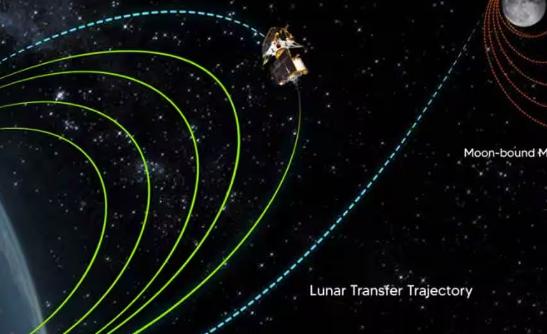
New Delhi: The eagerly awaited separation of India’s Chandrayaan-3’s lander Vikram from its propulsion module is scheduled for Thursday, August 17, 2023. Anticipation is building as the lander, accompanied by the rover Pragyaan, is poised to make its lunar touchdown on August 23. Once they touch down on the lunar surface, the Vikram lander will turn its lenses toward the Pragyaan rover, which is set to unfurl its instruments aimed at scrutinizing seismic activities on the Moon’s rugged terrain.
India’s ambitious lunar endeavour, Chandrayaan-3, celebrated a pivotal achievement recently, successfully executing its fifth and final orbit manoeuvre bound for the Moon. This manoeuvre manoeuvred the spacecraft even closer to its lunar destination. With all lunar-bound manoeuvres now behind it, the spacecraft is set to embark on the upcoming separation of the lander, Vikram, from the propulsion module.
While the focus remains fixed on India’s Chandrayaan-3 mission, the lunar domain is abuzz with heightened activity, and India is not navigating the lunar expanse alone. As of July 2023, the Moon is transforming into a bustling nexus of missions, featuring six active lunar orbiters and several more missions in the pipeline.
The ongoing lunar traffic comprises NASA’s long-standing Lunar Reconnaissance Orbiter (LRO), two probes from NASA’s revamped ARTEMIS mission, India’s Chandrayaan-2, the Korea Pathfinder Lunar Orbiter (KPLO), and NASA’s Capstone.
The LRO, launched in June 2009, gracefully orbits the Moon within a range of 50 to 200 kilometres, providing meticulous, high-resolution cartography of the lunar terrain. ARTEMIS P1 and P2, which assumed their lunar roles in June 2011, maintain stable equatorial orbits characterized by high eccentricities at an altitude of around 100 kilometres by 19,000 kilometres.
Chandrayaan-2, despite facing communication setbacks with its Vikram lander in 2019, continues to thrive in a polar orbit stationed 100 kilometres above the lunar surface. KPLO and Capstone further enrich the lunar activities, with Capstone manoeuvring in a Near-Rectilinear Halo Orbit (NRHO).
However, the lunar thoroughfare is on the cusp of witnessing even greater footfall. Russia’s Luna 25 mission, scheduled for launch on August 10, 2023, is poised to join the lunar ensemble, projecting its arrival into lunar orbit by August 16, 2023.
This mission bears the objective of exploring the lunar south pole, marking Russia’s resurgence to lunar exploration after a hiatus of 47 years. Luna 25 will seamlessly join the company of lunar orbiters, settling into an orbit 100 kilometres above the lunar terrain, with its anticipated landing on the Moon’s southern extremity pencilled in between August 21 and 23, 2023.
Nasa’s Artemis program, in tandem with the lunar renaissance, is mapping out ongoing lunar ventures. Artemis 1, a pioneering uncrewed test flight, encompassed lunar orbits and extended voyages beyond the Moon’s sphere in late 2022. Subsequent Artemis escapades are poised to amplify the lunar traffic. As the number of lunar quests swells, the Moon metamorphoses into a veritable crucible of scientific discovery and cosmic exploration.
Nonetheless, the surge in lunar sojourns also presents a challenge in orchestrating and overseeing the myriad of orbiters, thus averting potential collisions and fostering the triumph of these audacious undertakings. As our celestial aspirations soar, the Moon appears destined to be a bustling interlude on the cosmic journey of exploration.
Bureau Report
Leave a Reply